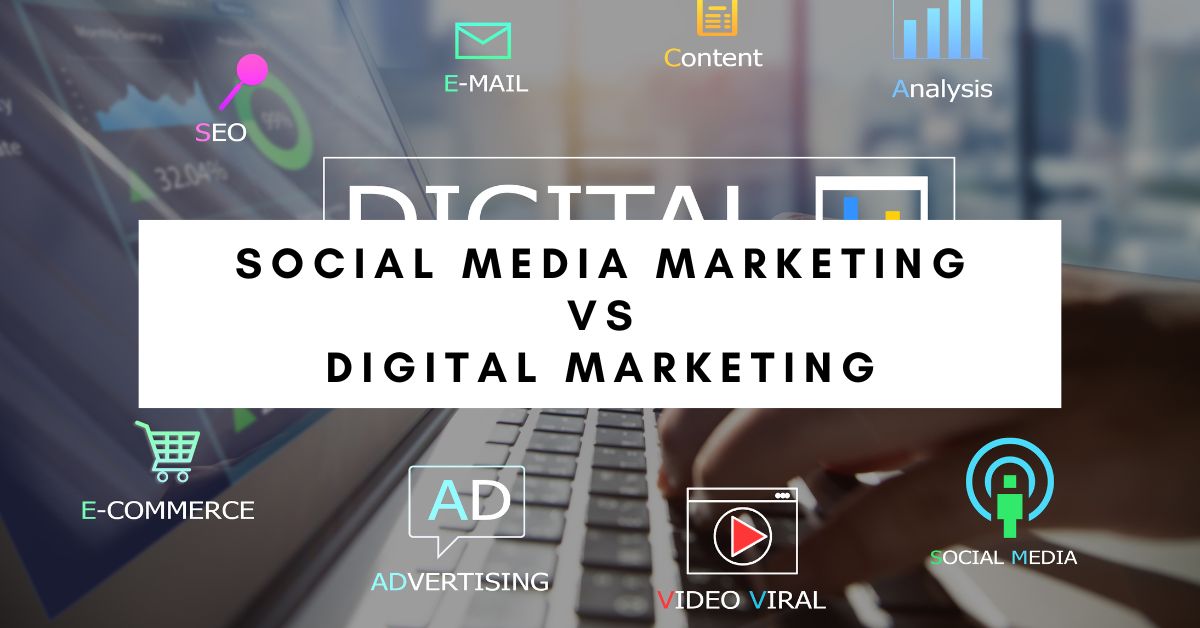Social Media Marketing vs. Digital Marketing: Unveiling the Distinctions and Synergies
Social Media Marketing vs. Digital Marketing: Unveiling the Distinctions and Synergies
In the fast-paced and ever-evolving landscape of modern business, effective marketing is an essential ingredient for success. With the advent of the digital age, two prominent marketing strategies have emerged as game-changers: Social Media Marketing (SMM) and Digital Marketing (DM). While the terms are often used interchangeably, they represent distinct approaches to reaching and engaging with a target audience. In this comprehensive article, we will delve into the differences between SMM and DM, exploring their unique strengths, and discovering how they can complement each other to form a powerful marketing synergy.

Table of Contents
SOCIAL MEDIA MARKETING VS. DIGITAL MARKETING
Part 1: Unraveling Social Media Marketing (SMM)
Social Media Marketing revolves around leveraging various social media platforms to connect with potential customers, build brand awareness, and foster meaningful relationships. These platforms include giants like Facebook, Twitter, Instagram, LinkedIn, and newer contenders like TikTok. SMM is all about crafting compelling content that resonates with the audience, stimulating user engagement, and ultimately driving conversions.
Benefits of Social Media Marketing:
Amplified Brand Exposure:
SMM enables businesses to interact with a vast, diverse audience, exponentially increasing brand visibility.
Humanizing the Brand:
By fostering direct interactions with consumers, SMM humanizes the brand and strengthens customer trust and loyalty.
Real-Time Feedback:
Social media platforms provide a platform for instant feedback, allowing businesses to adapt and improve their strategies promptly.
Cost-Effectiveness:
Compared to traditional advertising, SMM can be cost-effective, particularly for smaller businesses and startups.
Part 2: Decoding Digital Marketing (DM)
Digital Marketing is an overarching term encompassing a broad range of marketing tactics that operate across various digital channels. It includes SMM, but its scope extends far beyond social media. DM comprises Search Engine Optimization (SEO), Content Marketing, Email Marketing, Pay-Per-Click (PPC) Advertising, Influencer Marketing, and more. The primary goal of DM is to reach and engage potential customers through digital means and nurture them throughout the buyer’s journey.
Benefits of Digital Marketing:
Multi-Channel Presence:
DM allows businesses to be present on multiple platforms, reaching their audience wherever they are most active.
Precise Targeting:
Digital marketing tools enable precise audience targeting, ensuring messages reach the right people at the right time.
Measurable Results:
Unlike traditional marketing, DM provides detailed analytics, allowing marketers to measure campaign performance and optimize strategies accordingly.
Enhanced Customer Segmentation:
DM enables businesses to segment their audience based on various parameters, personalizing marketing efforts for greater effectiveness.
Part 3: Contrasts and Convergences
While Social Media Marketing and Digital Marketing share common ground, their core distinctions lie in their respective focuses and techniques.
Channel Emphasis:
SMM revolves around social media platforms, while DM encompasses a more extensive range, including search engines, websites, email, and more.
Interaction and Engagement:
SMM prioritizes building conversations and fostering interactions with customers, while DM aims to engage customers through various channels, often with less direct interaction.
Advertising Methods:
SMM relies heavily on organic content and paid social media advertising, while DM employs diverse methods like SEO, PPC, and email campaigns.
Immediate vs. Long-Term Impact:
SMM can yield immediate engagement and feedback, but its impact may wane over time. DM, on the other hand, may require more time to gain momentum, but its effects tend to be longer-lasting.
Part 4: Leveraging the Synergy
While the differences between SMM and DM are apparent, the real power lies in their synergy. Combining the strengths of both strategies can lead to a holistic marketing approach that maximizes results.
Integrated Campaigns:
Integrate SMM efforts into broader DM campaigns to maintain consistent branding and messaging across various channels.
Audience Insights:
Use social media as a platform to gain valuable insights into customer preferences and behavior, informing more targeted DM strategies.
Amplify Content Reach:
Social media acts as a distribution channel for content marketing efforts, helping businesses reach a broader audience and drive traffic to their websites.
Conversion Optimization:
Combine SMM and DM techniques to nurture potential customers throughout the sales funnel, optimizing conversion rates and customer retention.
Conclusion
In conclusion, Social Media Marketing and Digital Marketing may have distinct approaches, but they are complementary pieces of the modern marketing puzzle. Businesses should recognize the unique strengths of each strategy and embrace their synergy to maximize their marketing potential. By skillfully navigating the nuances of both SMM and DM, companies can achieve a powerful online presence, foster meaningful connections with their target audience, and secure a competitive edge in the digital era.



